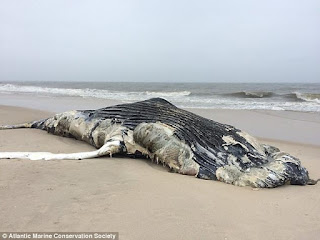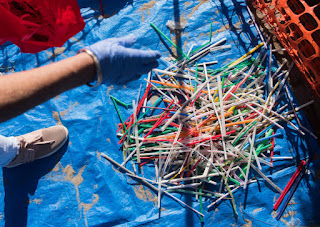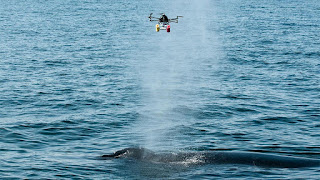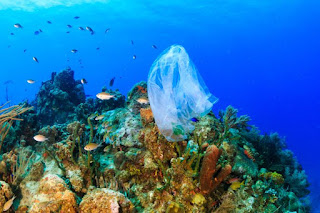1. Whale Dies By Eating 18 Pounds of Plastic Bags
A pilot whale died off the coast of Thailand after swallowing 80 plastic bags weighing nearly 18 lbs. Watchara Sakornwimon, the vet who carried out the necropsy, told the press that the case was one of the worst she'd seen. Nearly 300 marine animals including pilot whales, sea turtles and dolphins, are killed each year in Thailand from plastic consumption.
Read More...
-----------------------------------------------
2. 50 Nations Vowing to Reduce Plastic More than 50 nations are taking action to reduce plastic pollution, says the UN in the biggest report so far. India, Ecuador, Sri Lanka and China are but a few of the 50 nations committed to taking immediate concrete actions that will result in less plastic usage.
More than 50 nations are taking action to reduce plastic pollution, says the UN in the biggest report so far. India, Ecuador, Sri Lanka and China are but a few of the 50 nations committed to taking immediate concrete actions that will result in less plastic usage.Read More...
-----------------------------------------------
3. Dead Whale Washes Ashore New York Beach
 The Atlantic Marine Conservation Society has responded to five calls about large whales in distress. All five showed evidence of blunt force trauma consistent with being struck by a boat, according to the society.
The Atlantic Marine Conservation Society has responded to five calls about large whales in distress. All five showed evidence of blunt force trauma consistent with being struck by a boat, according to the society.Read more...
-----------------------------------------------
4. Chile Joins Worldwide Push to Ban Plastic Bags
-----------------------------------------------
 A big food-service company with eateries at major U.S. college campuses, museums and other institutions is going to ban plastic straws and stirrers at all of its more than 1,000 locations in 33 states.
A big food-service company with eateries at major U.S. college campuses, museums and other institutions is going to ban plastic straws and stirrers at all of its more than 1,000 locations in 33 states.Read more...
-----------------------------------------------
6. Half of All Patents for Genes From Marine Species Held By One Company

Researchers found that nearly every genetic sequence from ocean organisms on record, belonged to companies, universities and other entities located in just 10 countries. Genetic information from deep-sea creatures has immense potential value for medicine, food and even fuels, and the scientists behind the analysis expressed concern that this wealth is not being fairly distributed.
Read more...
-----------------------------------------------
 Editorial Note: Sea Save Foundation is heavily invested in this effort and has hosted a petition to help promote this effort.
Editorial Note: Sea Save Foundation is heavily invested in this effort and has hosted a petition to help promote this effort.
8. Drones Help Scientists Study and Protect Whales
 Scientists have begun using drones to perform a whole new kind of health checkup on whales. It’s awfully hard to dive into the ocean and draw a bit of blood or take a tissue sample from a passing whale. But it’s also unnecessary, because whales give away more than enough biological samples of themselves all the time. Every time they breach and spout, they’re spraying not just sea water into the air, but a generous helping of whale mucus. These drones help capture these samples.
Scientists have begun using drones to perform a whole new kind of health checkup on whales. It’s awfully hard to dive into the ocean and draw a bit of blood or take a tissue sample from a passing whale. But it’s also unnecessary, because whales give away more than enough biological samples of themselves all the time. Every time they breach and spout, they’re spraying not just sea water into the air, but a generous helping of whale mucus. These drones help capture these samples.
7. Proposed California Law to Limit Plastic Straw Use Passes Assembly
 Editorial Note: Sea Save Foundation is heavily invested in this effort and has hosted a petition to help promote this effort.
Editorial Note: Sea Save Foundation is heavily invested in this effort and has hosted a petition to help promote this effort.
A measure that would prohibit restaurants from providing single-use plastic straws unless requested by a customer was approved by the Assembly on Wednesday and will now be considered by the state Senate. The proposed law, AB 1884, is intended to reduce the number of straws that end up on the beach and in the ocean, as well as in landfills.
-----------------------------------------------
8. Drones Help Scientists Study and Protect Whales
 Scientists have begun using drones to perform a whole new kind of health checkup on whales. It’s awfully hard to dive into the ocean and draw a bit of blood or take a tissue sample from a passing whale. But it’s also unnecessary, because whales give away more than enough biological samples of themselves all the time. Every time they breach and spout, they’re spraying not just sea water into the air, but a generous helping of whale mucus. These drones help capture these samples.
Scientists have begun using drones to perform a whole new kind of health checkup on whales. It’s awfully hard to dive into the ocean and draw a bit of blood or take a tissue sample from a passing whale. But it’s also unnecessary, because whales give away more than enough biological samples of themselves all the time. Every time they breach and spout, they’re spraying not just sea water into the air, but a generous helping of whale mucus. These drones help capture these samples.
Read more...
9. Invention Safely Transports Deep-dwelling Fishes to the Ocean's Surface
 Unusual fishes from the ocean's deep and lesser-known deep waters are hitching a ride to the surface thanks to the newly invented SubCAS (or Submersible Chamber for Ascending Specimens). This ingenious pressurized chamber was engineered by the scientists-turned-inventors at the California Academy of Sciences and the Monterey Bay Aquarium.
Unusual fishes from the ocean's deep and lesser-known deep waters are hitching a ride to the surface thanks to the newly invented SubCAS (or Submersible Chamber for Ascending Specimens). This ingenious pressurized chamber was engineered by the scientists-turned-inventors at the California Academy of Sciences and the Monterey Bay Aquarium.
-----------------------------------------------
9. Invention Safely Transports Deep-dwelling Fishes to the Ocean's Surface
 Unusual fishes from the ocean's deep and lesser-known deep waters are hitching a ride to the surface thanks to the newly invented SubCAS (or Submersible Chamber for Ascending Specimens). This ingenious pressurized chamber was engineered by the scientists-turned-inventors at the California Academy of Sciences and the Monterey Bay Aquarium.
Unusual fishes from the ocean's deep and lesser-known deep waters are hitching a ride to the surface thanks to the newly invented SubCAS (or Submersible Chamber for Ascending Specimens). This ingenious pressurized chamber was engineered by the scientists-turned-inventors at the California Academy of Sciences and the Monterey Bay Aquarium.
-----------------------------------------------
Be sure to "LIKE" http://facebook.com/SeaSave to ensure our "Week in Review" is delivered to your newsfeed every Friday.
Sea Save Foundation is committed to raising awareness of marine conservation. The Week in Review is a team effort produced by the Sea Save staff to provide a weekly summary of the latest in marine research, policy, and news.

